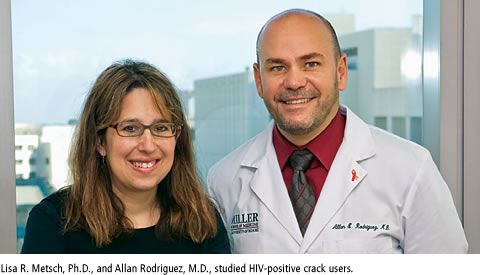
As part of the five-year HOPE study (Hospital Visit is an Opportunity for Prevention and Engagement), researchers at the Miller School and Emory University School of Medicine found that HIV- positive crack cocaine users frequently lack outpatient health care, do not receive antiretroviral therapy, and continue to engage in risky sexual behavior that likely contributes to HIV transmission. Physicians who treat these patients refer to them as “the forgotten population.”
Lisa R. Metsch, Ph.D., associate professor of epidemiology and public health at Miller, and Allan Rodriguez, M.D., associate professor of medicine and associate director of clinical immunology, represented the Miller School’s Developmental Center for AIDS Research (DCFAR) in the study partnership with the Center for AIDS Research at Emory.
“At a time when lifesaving medications are available to treat persons with HIV, there continues to be a population of HIV-positive people who have fallen through the cracks,” says Metsch, director of DCFAR’s behavior, social sciences, and community outreach core and principal investigator for the HOPE study.
During hospital visits, Metsch and other researchers interviewed 190 HIV-infected crack-using patients and worked with them to enter long-term medical care and drug treatment programs. The patients were also offered group counseling to reduce risky sex practices. One-quarter of the study participants reported having unprotected sex with an HIV-negative or unknown status partner in the preceding six months.
Previous studies of crack users in urban hospitals found that their drug use bars them from getting HIV-related care. The Miller School and Emory researchers are testing the effectiveness of an eight-session intervention program that helps participants get HIV care, teaches them about reducing risky sex practices, and helps them secure drug treatment. |


